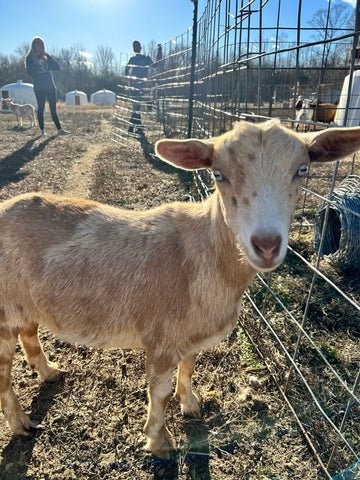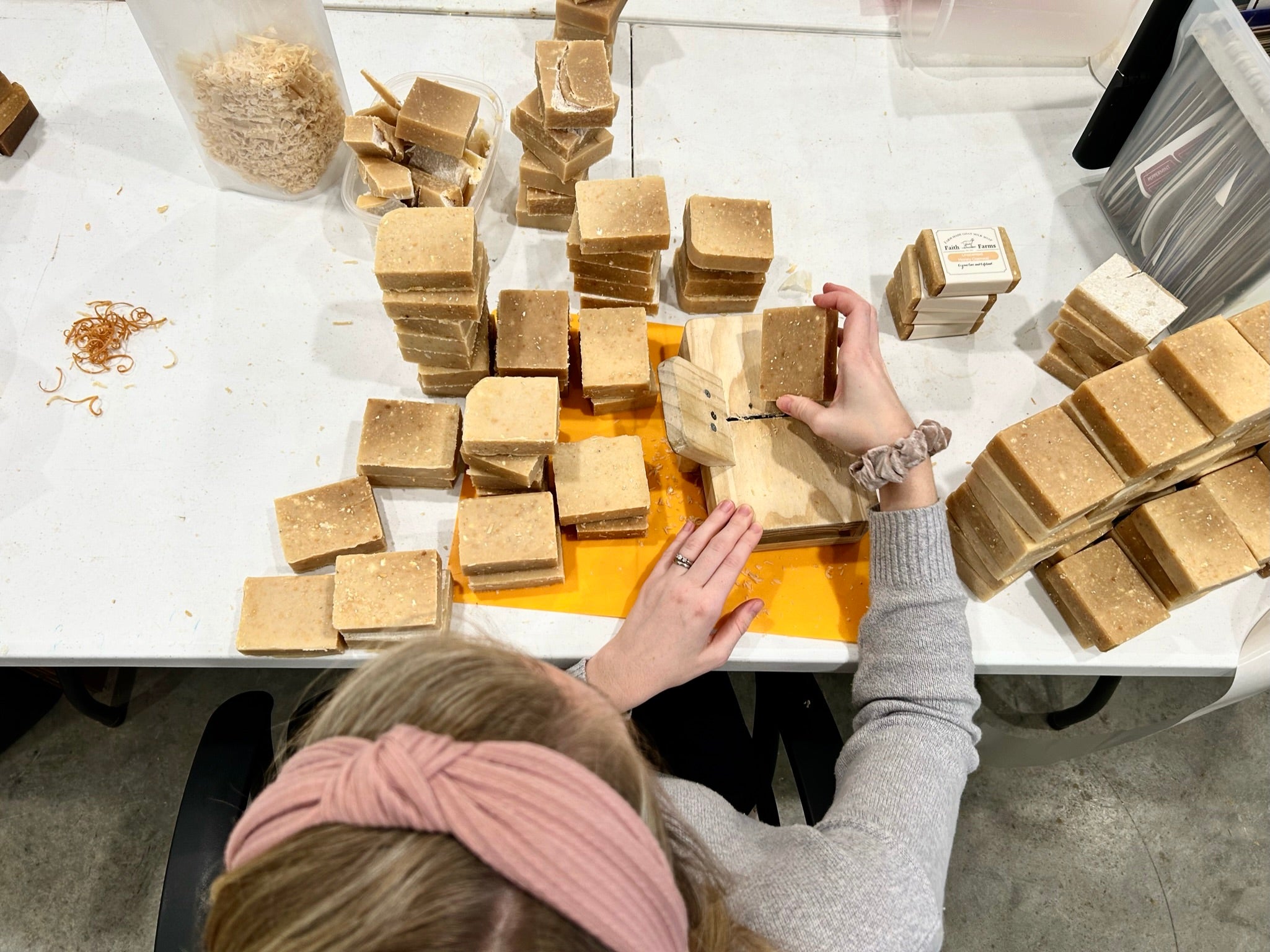This post is all about how to start a goat farm!
Starting a farm can be a daunting task, especially if you don't have any farming experience.
I know this because this was us twelve years ago when we got our first "gateway" farm animals; chickens! After an enjoyable experience learning to care for chickens and raise them for fresh eggs, we quickly decided to venture into the world of goats.
The reason we went with goats is simple: We wanted to raise them for milk and they're smaller than cows.
We learned a lot about goats in those first several years and now, 11 years later, we want to help others who may want to raise these funny creatures too!
In this post, we list the items you will need when raising goats, goat farming benefits and disadvantages, how many goats you should get, how much goats cost, and more! If you want to know all about goats or how to start a goat farming business, you're in the right place! Enjoy reading!
We know this post about how to start a goat farm will help you decide if it's right for you!
This post may contain affiliate links. You can read our full disclaimer here.
How to Start a Goat Farm: Everything You Need to Know
Is a goat farm profitable? Are goats worth owning?
If you're looking into homesteading and are considering a goat farm, please know that goat farms can be very profitable! There are numerous ways that goat farming for profit can be done or that a goat can be useful on a farm:- Milk: Goats can be milked twice a day for up to 2 years after kidding. Goat's milk can be used in many ways including to make cheese, yogurt, butter, soap, or to drink!
- Meat: Several breeds of goat can be used for their meat. Boer, Saanen, and Kiko goats are just a few of the breeds used for meat.
- Clearing brush: You can use goats to clear all kinds of unwanted brush on your property. Goats can clear poison ivy, overgrown bushes, and weeds. They can be rented for this purpose too!
- Hair: Some goats, such as the Angora breed, can be used for their hair. They produce a fiber called mohair that can be used or sold to make yarn!
Ashlen making goat milk soap in our farm warehouse!
How much does it cost to start a goat farm? What are the supplies needed for goats?
The start-up costs of a goat farm can vary depending on several different factors:- Do you already have land for your goats? You will need about an acre per every 5-7 goats at minimal. This is, obviously, the first cost.
- The variability of the pricing of the supplies you'll need for your goat farm. To help you determine costs of raising goats, we've made a complete list of supplies needed for goats with estimated prices for you. ☺️
How many goats should a beginner start with?
If you want to start out small with goat farming, we recommend 2-3 goats! Are you wanting to start your own small herd? Then we recommend starting with 2 does (try to pick does with a gentle and friendly disposition) and a handsome buck.
If all you're looking for is a couple of pets, then the best options would be two does, a doe and a wether (neutered male), or two wethers.
We started out with 4 goats and now have 20 after 10+ years of goat farming! You can read more about our journey with our goat farm.
What is the minimum number of goats to keep?
The minimum number of goats to keep is two. You never want your little goat to be lonely, so always make sure they have a friend. Goats are social creatures and prefer to be in herds.
They will get bored, destructive, and loud in calling out for a companion. If you are looking for a little companion for some farm animals you might already own, then your goat could also thrive with a horse, pig, cow, or guardian dog, as long as they are not alone.
However, another goat friend would be best, preferably two goats from the same herd so that they are well acquainted and comfortable with each other.
How many acres do you need for a goat farm? Can you raise goats on 1 acre?
You can do a very simple goat farm on one acre. One acre can hold about 6-8 goats that can be used for milking, meat, soaps and other goat milk products, brush clearing, or for their hair!

How High Maintenance Are Goats?
Are goats hard to keep?
Goats can be a little tricky in a few ways. They can be hard to keep in a fence. Goats are browsers, so if they run out of things to browse on they can get curious and search for fresh leaves and brush. We always heard that "if you can build a fence that holds water then it can hold a goat." There is some truth to that!
We have found the most success using cattle panels and electric fencing. We do not keep the electricity on at all times though. Once a goat is trained on an electric fence you can usually keep it off.
Goats are also very susceptible to getting worms or other parasites which can make them sick or even cause death. It's best to become very familiar with the parasites that your goat might encounter and what treatments are recommended.
Even better than that, get a good understanding of ways to prevent your herd from parasites. Research things like: pasture/grass length, rotational grazing/browsing, benefits of gut health and loose minerals.
Having a healthy goat goes a long way toward helping them fight off any parasites or other illness they may encounter,
What are the cons of owning a goat?
Just as you would expect, there are disadvantages of goat farming. Goats are not animals that you can just put out in the pasture and leave to fend for themselves. They need regular attention. You'll constantly be doing things like:- Checking water availability
- Checking hay or browse availability
- Health checks
- Hoof trims
Sickness usually happens very quickly with goats. Our vet told us that they seem to hide their illness until it is at critical level because they are so low in the food chain.
With all that being said, it is not easy to just pack up and take a vacation away from the farm without getting a responsible helper to take over the daily care of your little herd.
Do all goats need to be milked?
Not every female goat that just kidded has to be milked. If you're not interested in using the milk for other purposes (such as making goat milk soap, like we do here at Faith Farms), you can just leave the babies with their mother and all of her milk will be taken care of by her babies.
However, there are instances in which you will need to intervene and take over milking the mama:
- In the case where the babies are just nursing on one side. -- You may need to milk the side they are avoiding to relieve engorgement and prevent mastitis.
- To diagnose mastitis if you notice something is off about a lactating female.
- At times when there is a newborn who is not thriving, you may want to milk the doe so you can bottle feed the baby and ensure he/she is getting the nutrition needed.
If you want to milk your goats in order to use the milk, there are 2 options:
1. Milk share: We personally use this option. It entails leaving the kids with their doe full time for the first 2 weeks (until they start getting interested in grain or hay.) We then start separating the kids from the doe at night (usually around 7-8pm.)
We will then milk the doe approximately 12 hours later and then immediately reunite the doe with her kids so they can spend the day together, with the kids nursing throughout the day.
2. Bottle feed: Other goat owners prefer to separate the kids at birth and bottle feed while milking the mamas from the beginning.

Ashlen milking one of our Nigerian Dwarf goats!
How often do you clean goat poop?
You should clean up the goat poop in their pens and where they sleep often. Goat pens need to be cleaned at least once a week so they have a clean place to sleep and chew their cud.
Goat poop can be pretty easy to clean up because their poop is in little pebbles that can be swept or scooped up.
Goat poop is also a great fertilizer for gardens! Another option is to use deep litter bedding. This is where you just keep adding your preferred bedding in layers on top of the old dirty bedding.
We've found that barn lime helps to neutralize some of the ammonia/urine smell. If done properly, you should not have a smelly barn. However, the build up of urine and, therefore, ammonia is not healthy for your goats lungs.
How often do you need to check goats? Can you leave goats unattended?
I often tell people that goats are like 4 legged toddlers! If there is a way to get in trouble, they WILL find it! Goats need regular supervision to be sure they are safe and healthy.
In mild temperatures, a goat should be checked every 4-6 hours. You also need to watch for predators or have a reliable livestock guardian. Meet our livestock guardian dog, Nancy, below!

If not careful, goats can also get caught in a fence or hayfeeder.
Lastly, escapees are something every goat owner deals with (at least until you get your fencing secure and reliable.) However, even then, there will be a goat or two who makes sure you don't get too comfortable with your fencing abilities!!
In more extreme weather they should be checked every 2-3 hours to make sure they have clean water and are safe. It is amazing how quickly a goat can get in a situation where they need your assistance!
On a more positive note, if left unattended, and a goat finds itself in trouble, they will begin yelling out for someone to help!
This post was all about how to start a goat farm. Do you have any other questions about how to start a goat farm? Please feel free to comment below!


